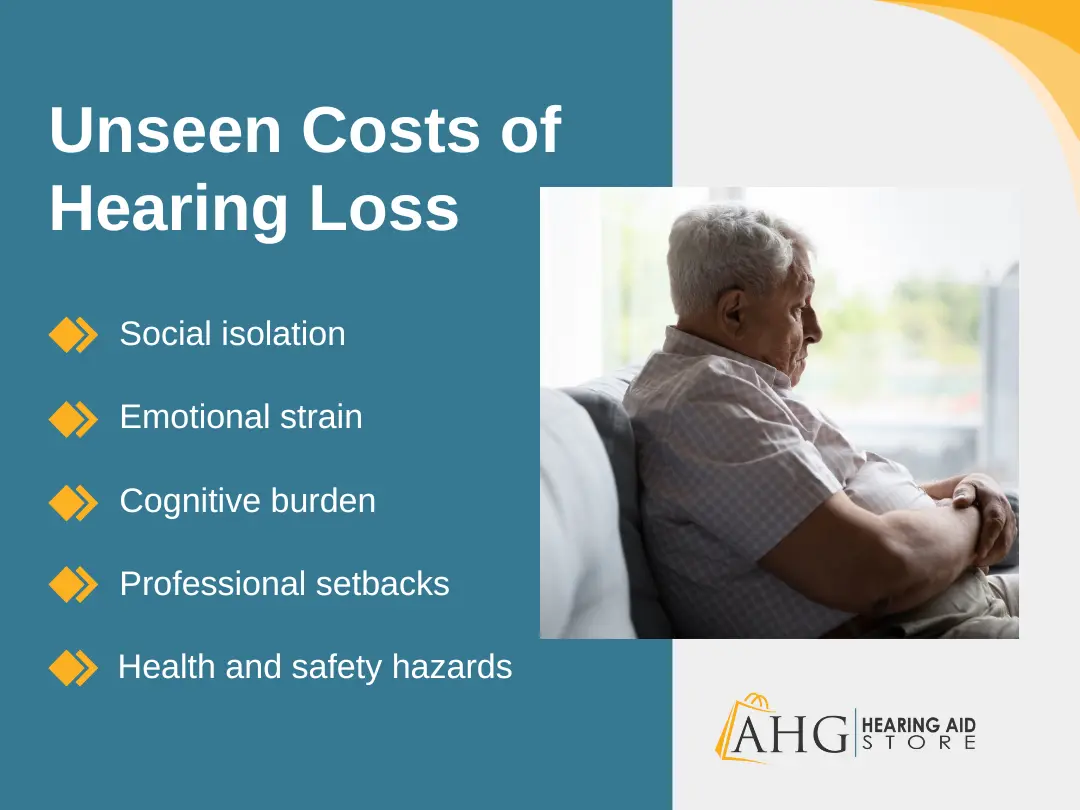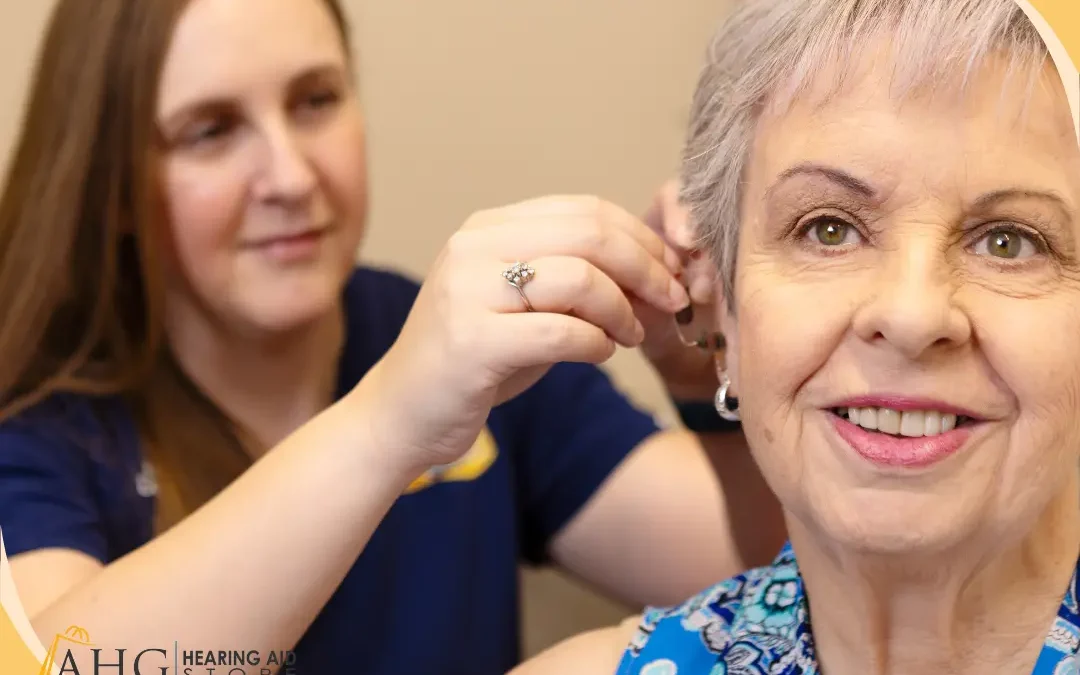
Imagine sitting at a family dinner, the laughter and stories swirling around you like a distant echo. You nod along, pretending to follow, but inside, frustration builds as words slip away. This isn’t just about missing a punchline—it’s the start of something deeper.
Hearing loss affects millions of people worldwide, but its impacts go far beyond muffled sounds. The unseen costs of hearing loss creep into every corner of life, from strained relationships to hidden health risks.
In this blog, we’ll uncover these invisible burdens, explore how hearing aids can be a game-changer in hearing loss treatment, and explain why a truly effective plan requires more than just devices. Ultimately, partnering with experts like the audiologists at Advanced Hearing Group can help you reclaim not just your hearing, but your quality of life.
The Hidden Toll: Unpacking the Unseen Costs of Hearing Loss
Hearing loss isn’t just an ear issue—it can disrupt multiple parts of your life. While the physical inability to hear clearly is obvious, the unseen costs of hearing loss manifest in subtle, compounding ways that can erode quality of life over time. Let’s take a closer look at some of these key areas.

1. Social Isolation: The Silent Withdrawal
One of the most heartbreaking unseen costs of hearing loss is the gradual retreat from social connections. When conversations become a struggle, people often avoid social gatherings altogether. This leads to feelings of being left out, as family events, dinners with friends, or even casual chats feel exhausting.
Studies show that untreated hearing loss can exacerbate isolation, strain relationships, and reduce participation in community activities. Over time, this social withdrawal creates a vicious cycle, where loneliness feeds into further disengagement, impacting overall well-being.
Related Article: Why Untreated Hearing Loss Can Lead to Depression and What You Can Do About It
2. Emotional Strain: The Mental Health Shadow
Emotionally, the unseen costs of hearing loss can be profound. The constant effort to lip-read or piece together sounds breeds frustration, stress, and even depression. Confidence takes a hit when you second-guess every interaction, leading to reduced self-esteem and mood changes that build slowly.
Research links untreated hearing loss to higher rates of anxiety and emotional fatigue, as the brain’s relentless work to compensate leaves little room for emotional resilience. It’s not uncommon for individuals to feel overwhelmed, irritable, or withdrawn, turning what should be joyful moments into sources of dread.
Related article: The Connection Between Hearing Loss and Anxiety: What You Need to Know
3. Cognitive Burden: Brain Strain and Long-Term Risks
Perhaps one of the most alarming unseen costs of hearing loss is its impact on the brain. When hearing fades, the brain must work overtime—known as increased cognitive load—to interpret garbled sounds. This “brain strain” diverts resources from memory, focus, and problem-solving, potentially accelerating cognitive decline.
Shockingly, hearing loss is associated with a 35% higher risk of dementia, with the risk rising 16% for every 10 decibels of hearing loss. Untreated cases can lead to brain atrophy from reduced auditory stimulation, compounding issues like forgetfulness and slower thinking. Social isolation from hearing challenges further limits mental engagement, heightening these risks.
4. Professional Setbacks: The Career Killer
In the workplace, the unseen costs of hearing loss hit hard on productivity and earnings. Misunderstanding instructions during meetings or struggling in noisy environments leads to errors, fatigue, and reduced efficiency. Career advancement suffers too, as communication breakdowns limit opportunities for collaboration and promotion.
5. Health and Safety Hazards: Beyond the Ears
Physically, the unseen costs of hearing loss extend to broader health risks. Missing critical sounds like alarms, horns, or calls for help increases accident risks and compromises safety in daily life.
Untreated hearing loss correlates with higher healthcare costs due to communication barriers leading to delayed care or medication errors. Severe cases in older adults can even raise mortality risk, while balance issues tied to inner ear problems heighten fall risks.
These unseen costs of hearing loss are real barriers to living fully. But there’s hope: addressing them starts with effective treatment.
Hearing Aids: A Powerful First Step in Hearing Loss Treatment
Hearing aids are often the cornerstone of hearing loss treatment, and for good reason. These small, sophisticated devices amplify sounds, filter out background noise, and restore clarity to conversations.
Modern hearing aids come in sleek designs with features like Bluetooth connectivity for streaming calls or music directly to your ears. They can reduce the cognitive load by providing clearer audio signals, easing brain strain, and improving focus.
But while hearing aids are transformative, they’re not a cure-all. They excel at amplification but may not address underlying causes like balance disorders or tinnitus. That’s where a broader approach is necessary.
Beyond Devices: Building a Comprehensive Hearing Loss Treatment Plan
A truly effective hearing loss treatment plan goes beyond hearing aids to encompass a holistic strategy tailored to your needs. This includes:
- Thorough Assessments: Starting with comprehensive hearing tests to pinpoint the type and severity of loss.
- Assistive Technologies: Hearing Assistive Technology Systems (HATS) like amplified phones or captioning devices enhance specific situations, working alongside or independently of hearing aids.
- Balance and Tinnitus Management: Audiologists address related issues like vertigo or ringing in the ears through specialized therapies.
- Counseling and Lifestyle Support: Education on communication strategies, noise protection, and emotional coping helps mitigate social and cognitive impacts. Early intervention can even lower dementia risks.
- Advanced Options: For severe cases, cochlear implants or surgical interventions may be considered as part of the progression from hearing aids.
This multifaceted plan ensures you’re not just hearing better but living better, reducing the unseen costs of hearing loss across all fronts.
Partnering with Experts: Why Choose Advanced Hearing Group
To navigate this journey, working with a trusted audiologist is key. At Advanced Hearing Group in Scottsdale and Mesa, AZ, our team offers personalized care that embodies comprehensive hearing loss treatment. From detailed hearing evaluations and custom-fitted hearing aids to ear wax removal, balance testing, and tinnitus solutions, we cover it all. Accepting most insurances, we make expert care accessible, helping you hear well and live well without the hidden burdens holding you back.
The unseen costs of hearing loss are too high to ignore—they rob you of connections, health, and opportunities. While hearing aids are a vital tool in hearing loss treatment, a comprehensive plan unlocks true freedom.
Don’t let silence steal your story. Schedule an appointment with one of our audiologists today and step into a world of clear, confident living.





